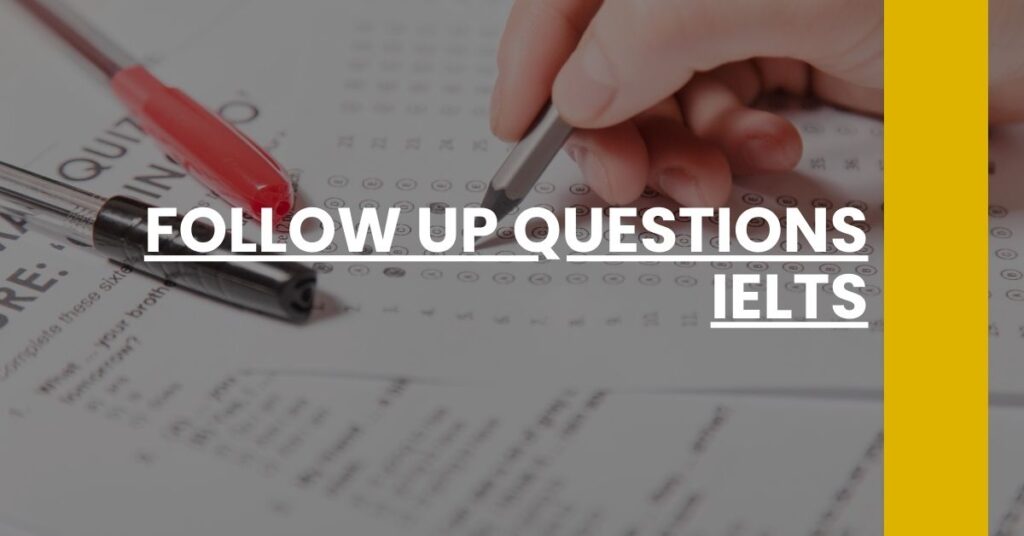Master your response to follow up questions IELTS with precision.
- Ace Your Response: Learn strategies for effective answers.
- Boost your Score: Understand how these questions impact scoring.
- Speak with Confidence: Tips for fluent and relevant responses.
Navigate follow up questions in IELTS effortlessly for a higher band score.
- Understanding Follow-Up Questions in IELTS
- How Follow-Up Questions Impact Your IELTS Score
- Strategies for Answering Follow-Up Questions Effectively
- Common Pitfalls to Avoid with Follow-Up Questions
- Practice Drills for IELTS Follow-Up Questions
- Real-Life Examples of IELTS Follow-Up Questions
- Resources for Further Practice and Learning
- Conclusion
Understanding Follow-Up Questions in IELTS
In the IELTS Speaking test, your ability to navigate follow-up questions can significantly bolster your performance. These questions, though brief, are a crucial second act after your initial response. They’re not just about testing your speaking skills but also about gauging your ability to think on your feet and your proficiency in conveying more complex ideas.
Why Are They Important?
Follow-up questions represent an opportunity to deepen the conversation and showcase your command of the English language. They’re crafted to probe further into your initial answers, allowing you to demonstrate an array of language skills, from vocabulary to fluency, grammar to pronunciation. Handling these questions with finesse can elevate your IELTS score, reflecting your proficiency in a real-world English-speaking environment.
Types of Follow-Up Questions
You may encounter a variety of follow-up questions, such as:
- Opinion-based questions: What are your thoughts on…?
- Experience-based questions: Can you tell me about a time when…?
- Hypothetical questions: What would you do if…?
Each type requires a slightly different approach but collectively, they demand you to think quickly and respond effectively.
How Follow-Up Questions Impact Your IELTS Score
IELTS Speaking is not just about correctness but also natural conversation skills. Your responses to follow-up questions inform the examiners about your linguistic agility. Strong answers signal your ability to engage in genuine discourse, a key component in achieving a high band score.
What Examiners Look For
Examiners are keenly observing how well you:
- Communicate ideas: Can you explain concepts clearly and effectively?
- Stay coherent: Are your responses logically structured and easy to follow?
- Show linguistic range: Are you using a variety of sentence structures and vocabulary?
By delivering thoughtful answers, you demonstrate the real-world English abilities the IELTS aims to measure.
Strategies for Answering Follow-Up Questions Effectively
Answering follow-up questions seamlessly is both an art and a skill. Here are some tried-and-tested strategies to ensure you’re delivering rich, fluent, and coherent responses in your IELTS Speaking test.
Structuring Your Responses
Organize your thoughts quickly with a simple structure:
- Acknowledge the question: Start by responding directly to the question asked.
- Expand your answer: Provide details, examples or reasons to flesh out your response.
- Conclude or transition: Wrap up with a concluding statement or transition smoothly into another related point.
Demonstrating Language Proficiency
This is your moment to shine. Flex your lexicon muscles and your grammatical prowess while being careful not to overcomplicate your language. Aim for clarity and precision. Utilize a mix of sentence structures—from simple to complex—and don’t shy away from showing off a phrasal verb or an idiom if it fits naturally into your discourse.
Buying Time Gracefully
Sometimes, you need a moment to gather your thoughts. Phrases like, “That’s an interesting question,” or, “I think it would depend on…” can serve as linguistic stepping stones, giving you that necessary pause without disrupting the flow of conversation.
Avoiding Common Mistakes
You’ll want to dodge potential pitfalls, such as pausing too long, overusing fillers like ‘um’ or ‘like’, or going off on tangents.
By centering your responses on these strategies, you’ll not only tackle follow-up questions in your IELTS exam with greater confidence, but you’ll also impress the examiners with your eloquence and composure.
Common Pitfalls to Avoid with Follow-Up Questions
We all have stumbled at some point while navigating through the nuanced paths of language during a high-stress situation such as the IELTS. Recognize the typical missteps many fall prey to, and sidestep them with informed caution as you perfect your skills in handling follow-up questions in IELTS.
Understanding the Question
- Key Idea: Listen Intently.
Misunderstanding the follow-up question can derail your response before you’ve even begun. Make sure to listen carefully and ask for clarification if needed. Responding correctly to what is asked is crucial.
Staying Relevant
- Essential Strategy: Stick to the Topic.
Straying from the topic not only showcases disorganization but also wastes precious time. Keep your answers focused on the question at hand.
Grammar and Vocabulary Overreach
- A Balanced Approach: Stay Within Your Comfort Zone.
While it’s tempting to impress the examiner with complex vocabulary and advanced grammar, prioritize clarity and correctness. Use words and sentence structures you are comfortable with to minimize mistakes.
Pauses and Fillers
- Fluency Over Perfection: Smooth Over the Cracks.
Frequent pauses and overuse of fillers can chip away at the fluency of your response. Practice techniques to buy thinking time more gracefully.
Practice Drills for IELTS Follow-Up Questions
Deliberate practice shapes skills like clay on a potter’s wheel. The more you engage with follow-up question drills, the more dexterous your speaking becomes. Use these practice drills to craft your response mechanism into a work of art.
- Record and Review: Capture your responses to follow-up questions on a recording device. Listening back can reveal areas for improvement that might otherwise go unnoticed.
- Mirror Practice: Stand before a mirror and speak. Observe your body language and facial expressions. How you carry yourself can impact the perceived confidence in your responses.
- Role-Play Interviews: Enlist a language partner or a tutor to conduct mock IELTS interviews. The more you simulate the test conditions, the more adept you become at handling the pressure.
Use these drills to prepare for the curveballs and surprises that follow-up questions can sometimes throw at you. A consistent practice routine solidifies your strategy and preps you for the real test.
Real-Life Examples of IELTS Follow-Up Questions
Peruse through instances from past IELTS tests to understand the nature of follow-up questions you might encounter. These samples provide a concrete basis for anticipating the kind of elaboration and examples expected of you.
Example Dissections:
Consider this common follow-up question: Tell me how you think music influences our lives. Here’s how to deal with it:
- Poor Response: “I think music is important.”
This answer lacks depth and fails to address how music influences lives. - Strong Response: “Music profoundly influences our lives by shaping our emotions, cultural identities, and even social interactions. For instance, a national anthem stirs patriotic feelings, while a lullaby provides solace.”
By examining such examples and crafting your responses, you gain the clarity and command needed to deliver articulate, rich answers.
Resources for Further Practice and Learning
As you tread further on your IELTS preparation journey, remember that a vast sea of resources is available at your fingertips. To deepen your understanding and refine your handling of follow up questions in IELTS, consider exploring:
- Official IELTS practice materials: Published by the test makers themselves, these materials offer valuable insights into the testing process.
- British Council’s test tips: This hub includes tips, practice exercises, and strategies aimed at honing your speaking skills.
These resources are springboards that launch you towards excellence in dealing with IELTS follow-up questions. They’re curated to address common questions, provide practice prompts, and offer expert advice to ensure you’re fully equipped for test day.
Conclusion
Mastering follow-up questions in IELTS is an integral part of your journey to score high on the speaking section of the test. By understanding and avoiding common pitfalls, engaging in targeted practice, and dissecting real-life examples, you lay the groundwork for fluent, confident responses. Remember, every follow-up question is an opportunity—a chance to illustrate the depth of your language skills. Embrace it. Practice it. Conquer it.
Master follow-up questions in IELTS with top strategies to enhance responses and boost your speaking test score. Learn more here.

